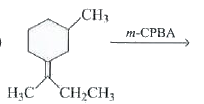Which of the following reactions give alkylation product :




The correct Answer is:A,B,D
To determine which of the given reactions yield alkylation products, we need to analyze each reaction step by step. Alkylation refers to the introduction of an alkyl group into a molecule, typically through a reaction with an electrophile that does not contain any heteroatoms (like oxygen).
1. Reaction of Benzene with Cyclobutanol in Acidic Medium:
- Cyclobutanol acts as an electrophile in the presence of acid.
- The cyclobutyl cation is formed when cyclobutanol loses a water molecule.
- The benzene ring attacks the cyclobutyl cation, leading to the formation of an alkylation product.
- Conclusion: This reaction gives an alkylation product.
2. Reaction of Benzene with Cyclohexene in the Presence of H+:
- Cyclohexene can undergo electrophilic addition to form a cyclohexyl cation.
- The benzene ring attacks this cyclohexyl cation, resulting in the formation of an alkylation product.
- Conclusion: This reaction also gives an alkylation product.
3. Reaction of Benzene with CH3COCl in the Presence of AlCl3:
- CH3COCl (acetyl chloride) reacts with AlCl3 to form an acylium ion (CH3C^+=O).
- The benzene ring attacks this acylium ion, leading to the formation of acetophenone, which contains a carbonyl group (C=O).
- Conclusion: This reaction gives an acylation product, not an alkylation product.
4. Reaction of Benzene with Me3C(=O)Cl in the Presence of AlCl3:
- Me3C(=O)Cl reacts with AlCl3 to generate a tert-butyl cation (Me3C+).
- The benzene ring attacks this tert-butyl cation, resulting in the formation of an alkylation product.
- Conclusion: This reaction gives an alkylation product.
Final Answer:
The reactions that give alkylation products are:
- Reaction with Cyclobutanol (A)
- Reaction with Cyclohexene (B)
- Reaction with Me3C(=O)Cl (D)
Thus, the correct options are A, B, and D.
- Cyclobutanol acts as an electrophile in the presence of acid.
- The cyclobutyl cation is formed when cyclobutanol loses a water molecule.
- The benzene ring attacks the cyclobutyl cation, leading to the formation of an alkylation product.
- Conclusion: This reaction gives an alkylation product.
- Cyclohexene can undergo electrophilic addition to form a cyclohexyl cation.
- The benzene ring attacks this cyclohexyl cation, resulting in the formation of an alkylation product.
- Conclusion: This reaction also gives an alkylation product.
- CH3COCl (acetyl chloride) reacts with AlCl3 to form an acylium ion (CH3C^+=O).
- The benzene ring attacks this acylium ion, leading to the formation of acetophenone, which contains a carbonyl group (C=O).
- Conclusion: This reaction gives an acylation product, not an alkylation product.
- Me3C(=O)Cl reacts with AlCl3 to generate a tert-butyl cation (Me3C+).
- The benzene ring attacks this tert-butyl cation, resulting in the formation of an alkylation product.
- Conclusion: This reaction gives an alkylation product.
The reactions that give alkylation products are:
- Reaction with Cyclobutanol (A)
- Reaction with Cyclohexene (B)
- Reaction with Me3C(=O)Cl (D)
Topper's Solved these Questions
Similar Questions
Knowledge Check
Which of the following reactions give diasteremeric product?
A B
B C
C D
D
Which of the following reactions give meso product?
A B
B C
C D
D
Which of the following reactions will give identical products ?
A B
B C
C D
D
Which of te following reaction gives correct major product-
View SolutionWhich of the following reactions give the poor yield of amine products?
View SolutionWhich of the following reactions would give identical product?
View SolutionIn which of the following reactions migration of alkyl group from carbon to oxygen is observed ?
View SolutionWhich of the following reactions will give ether as main product?
View Solution
